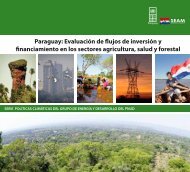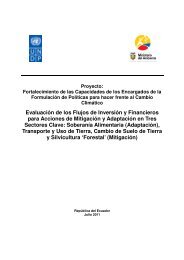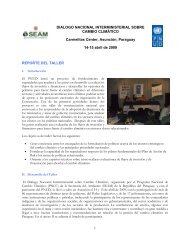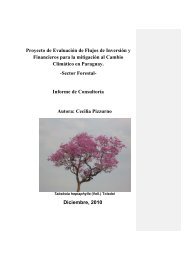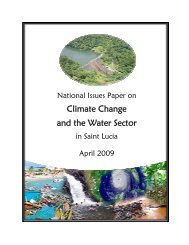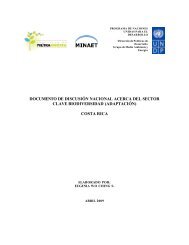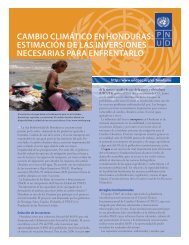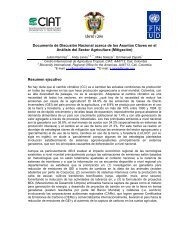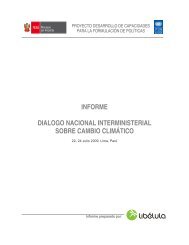View Publication - UNDPCC.org
View Publication - UNDPCC.org
View Publication - UNDPCC.org
You also want an ePaper? Increase the reach of your titles
YUMPU automatically turns print PDFs into web optimized ePapers that Google loves.
13 Cannady — Access to Climate Change Technology by Developing Countries: A Practical Strategy<br />
based on the idea of sustainability through<br />
generation of technological improvements and<br />
creation of enterprises. A licensee can develop<br />
the technology, start a new company, create<br />
jobs, find synergies with other companies,<br />
enter markets and handle the technology as<br />
it sees fit within the framework of the licence<br />
agreement. Non-exclusive licensing can create<br />
even more synergies when multiple parties<br />
participate in developing a “platform” of<br />
related technologies. By contrast, a project<br />
may be over when physical construction is<br />
completed. Successful non-exclusive technology<br />
licensing lets a thousand flowers<br />
bloom; 47 successful project management grows<br />
plants in a pot.<br />
Precedents for packaged licensing programmes<br />
include the Public Intellectual Property<br />
Resource for Agriculture (PIPRA), a consortium<br />
of universities and research institutions that<br />
offers licences to agricultural patents. 48<br />
PIPRA also develops guidelines for licensing<br />
and sponsored research to encourage overall<br />
development of research innovations for use<br />
in agriculture while also retaining rights that<br />
member institutions need to fulfil their mission<br />
of research and product development for<br />
the broader public benefit and humanitarian<br />
purposes. Still, the fact remains that PIPRA<br />
offers royalty-bearing licences to IP owned by<br />
its member institutions that are, by and large,<br />
developed country institutions. Its success<br />
in terms of benefit to developing country<br />
institutions has yet to be documented.<br />
Model contracts are useful when understood<br />
as a tool that can be used by people trained<br />
in licensing, usually lawyers or businesspeople<br />
with licensing experience. The terms of<br />
model contracts reflect the positions and<br />
assumptions of the parties drafting the<br />
model contracts. So, for example, one of<br />
the most important issues in a licensing<br />
contract is the scope of the licence grant.<br />
Imagine a licence contract for a patent,<br />
documentation (copyright work) and knowhow<br />
(trade secrets) relating to wind energy. Is<br />
the patent owner granting the licensee broad<br />
rights to make, have made, use, sell, import<br />
and sublicense wind turbine functionality<br />
covered by the claims of the patent, plus the<br />
right to modify and distribute software and<br />
documentation under the licensee’s company<br />
name? Or does the licence grant include no<br />
rights to sell products practising the patent<br />
claims? The latter licence is far less valuable<br />
than the former and may be value-less. There<br />
are hundreds of variations and options in a<br />
licence agreement, and it would be difficult<br />
for a model contract to define “neutral”<br />
positions that would fit multiple contexts.<br />
Technology contracts differ in their form<br />
and content. No one form contract suits all<br />
circumstances. For this reason, it is key that<br />
developing country personnel be trained<br />
in negotiation of technology licensing and<br />
development collaboration agreements. This is<br />
an urgent need because only through experience<br />
and knowledge of practical IP skills will<br />
developing countries be able to use the system<br />
to their advantage. No automatic programmes<br />
or packaged portfolios by developed country<br />
parties can substitute.<br />
It may be argued that “that’s what lawyers<br />
are for” and that developing countries do<br />
have lawyers. However, what is needed is<br />
training of lawyers and other professionals<br />
in the special skills needed for effective<br />
negotiation of technology contracts. In both<br />
France and Senegal, a divorce lawyer will<br />
not necessarily have the skills to handle an<br />
IP licence negotiation. The good news is that<br />
training lawyers in technology licensing skills<br />
is not difficult, as the base skills of contract<br />
interpretation are present.<br />
Acknowledging the weakness of model contracts,<br />
an annotated set of model contracts<br />
is useful as a training tool. The annotations<br />
could explain the impact of choices of terms<br />
and would be a useful exercise. However,<br />
the utility of such a project would depend on<br />
its being used as a tool to empower people<br />
in developing countries to negotiate on an<br />
informed basis. Ideally, the project itself<br />
should be designed and developed with full<br />
participation by developing country personnel




